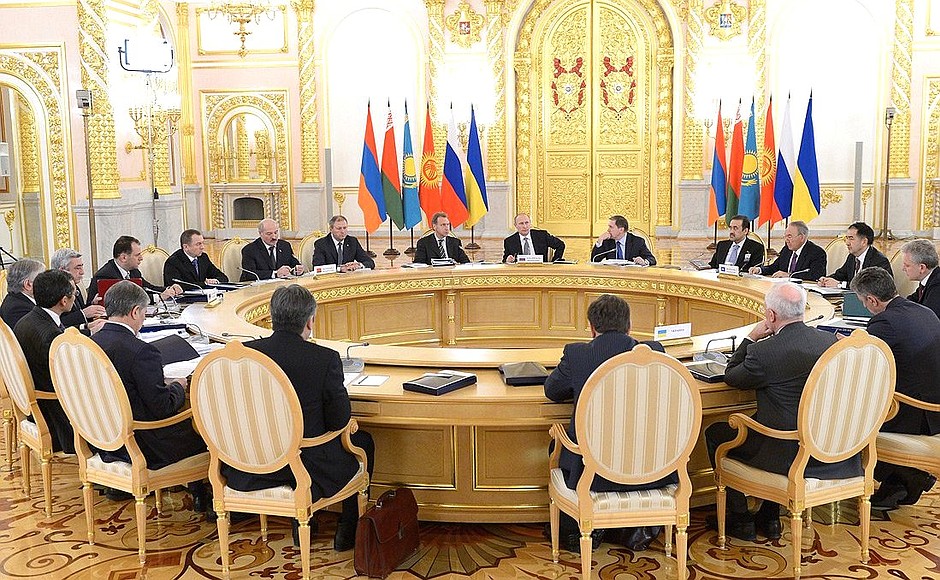
President of Russia Vladimir Putin: Friends,
It gives me great pleasure to welcome the presidents of Armenia and Kyrgyzstan and the Prime Minister of Ukraine to the meeting of the Supreme Eurasian Economic Council.
Mr Lukashenko, Mr Nazarbaev and I have just finished discussing the main trajectories for further deepening Eurasian integration. I would like to note here that the presidents of the three states have approved the institutional section of the draft agreement on the Eurasian Economic Union.
In particular, we have established the key principles of the Union’s activities: mutually advantageous cooperation for converging our economies, for their harmonious development and for enhancing competitiveness. The implementation of these principles is aimed primarily at improving the wellbeing of our citizens.
The next step is to approve the functional, or departmental, section of the agreement. We are working against very tight deadlines: the text has to be ready for signing by May 1, 2014. After that, the agreement will be presented to the parliaments of our states for ratification, so that the Eurasian Economic Union can become fully operational as of January 1, 2015. We need to meet these deadlines, and for this purpose, we have to enhance cooperation between our ministries and agencies, as well as expert groups.
I would like to note here that the departmental section should be filled as much as possible with specific commitments in terms of a common economic policy. We must finalise the codification of the entire contractual legal framework of the Customs Union and the Common Economic Space, eliminate all remaining exemptions from the trade and investment regulations, provide for the free movement of goods, services, capital and labour. In order to improve our information exchange on international and mutual trade we are setting up a special integrated data system. We also need to continue harmonising our anti-monopoly legislations. A number of new resolutions aimed at creating a system to protect honest and fair competition have been drafted and are ready for our approval upon the completion of this meeting. These resolutions give the Eurasian Economic Commission authority to monitor compliance with common rules of competition. A special body within the EurAsEC Court is being set up to hear cases dealing with possible violations of such rules.
See also
Colleagues, Eurasian economic integration creates conditions for the dynamic development of our countries. Despite the adverse global economic situation, the common market of the three member-states is expanding. In 2010–2012 trade between the Customs Union countries grew almost threefold to reach $67.8 billion. The share of raw materials in export-import operations is going down, and this was noted today in our discussions with both Mr Nazarbaev and Mr Lukashenko. I would like to stress that this is a very important part of our joint work. We are reducing mutual trade in raw materials and increasing trade in high-tech goods.
At the same time we are not isolating ourselves from other markets; on the contrary, we are aiming for harmonious interaction with all interested states. Armenia and Kyrgyzstan have already launched efforts to join the Customs Union. We see that our Armenian partners are ready to undertake commitments within the framework of our integration union. I believe that today we can approve the roadmap for Armenia’s accession.
We have also almost completed work on the roadmap for Kyrgyzstan, with only a few issues raised by our counterpart remaining open. I am sure that together with our friends from Kyrgyzstan we will find mutually acceptable solutions.
In conclusion, I would like to stress that the future of our large-scale integration project depends largely on the alignment of our actions in all areas of our cooperation. Russia is firmly committed to such joint work.
Thank you.